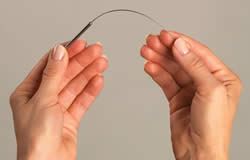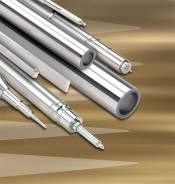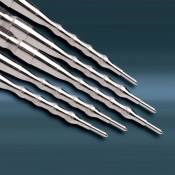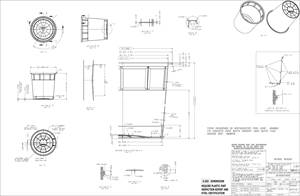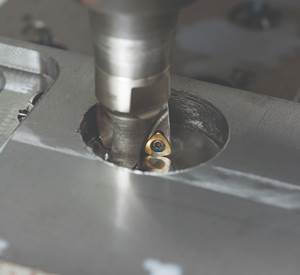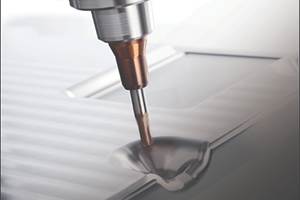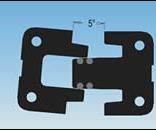Improving Quality and Lowering Mold Component Cost
Ejector and core pins come off the grinding machine with an SPI 4-5 surface finish when using special grinding process technology and proprietary diamond grinding wheels.
| The business profile for mold component suppliers has changed from offering standard components to offering off-the-shelf and custom .0001 and .0002 tolerance ejector pins, core pins, sleeves and ejector blades. No longer are .001 and .0005 tolerance suitable for the more demanding molding applications. Part geometry, engineered resins and nylon have driven moldmakers to design and build some of the world’s finest close-tolerance molds, and 24/7 molding operations mandate that high-cavitation tooling must be functioning perfectly.
The Component Challenge and SolutionNew grinding processes and CNC equipment produce close-tolerance repeatability. It is not uncommon to make 1,000 pieces of an ejector pin and have a total diameter tolerance variance of .00003-.00008. Flatness and parallelism for ejector blades is essential as is sleeve concentricity of .0004 or better. The advent of computer-controlled heat treating of premium M-2 steel has greatly aided tool builders requiring .0937 diameters down to .004 diameter. Good surface finish and stable molecular structure allow three to six times greater wear resistance, and significantly reduce brittleness and breakage (see Photo). Recent technology using special grinding processes and proprietary diamond grinding wheels, allow ejector and core pins to come right off the grinding machine with an SPI 4-5 surface finish. With this technology nearly 80 to 90 percent of polishing is eliminated, greatly reducing the component cost. Current sizes range from .500 diameter to 6" long. Water-cooled custom core pins for medical and personal care products are manufactured with a standard 6-10 micro finish. Strict adherence to .0002 shut-off heights and .002-.003 radii is critical. Total roundness and concentricity is maintained with Ded-Tru grinding operations. Typical syringe core pins with multiple diameters measure .0001-.0002 concentricity (see Photos).
Delivery Time Is EssentialWhen mold builders are looking for a component supplier, not enough can be said about the importance of on-time delivery. Often, $1,800.00 worth of custom core pins is the last component to be assembled in a $200,000.00 mold. Turning down work is not easy, but when a component supplier knowingly cannot meet the expected delivery schedule, communication becomes essential. Unusually designed components also must be addressed at the time of quoting. Halfway into a job is no time to start asking for geometry or tolerance changes. Obvious mold repairs require quicker deliveries and completely accurate shipping information. Because of reduced leadtimes for mold build and repair, moldmakers need to focus on readily available inventory—not only standard components, but specialty products, such as .001 increment core pins and +.0005, +.001, +.002, +.005 ejector pins. In addition look for .0001 increment M-2 ejector/core pins with one-week delivery, which can save mold builders time and money in mold repairs. High inventory levels are difficult in the current economy, but component suppliers that maintain more than 400 different diameters in stock open the door to many options for tool builders. Look for suppliers that have additional manufacturing support, which can expand their ability to offer size ranges to 36 inches for pins and .002 diameter to 1", as well as blades (13.5" long) and .010 thick with tolerances running .000080, which can expand a designer’s ability to create more technically challenging part configurations.
SummaryAs the molding industries advance, the passion of perfection continues as component suppliers serve the most demanding component applications for high-cavitation mold builders.
|
Related Content
It Starts With the Part: A Plastic Part Checklist Ensures Good Mold Design
All successful mold build projects start with examining the part to be molded to ensure it is moldable and will meet the customers' production objectives.
Read More6 Ways to Optimize High-Feed Milling
High-feed milling can significantly outweigh potential reliability challenges. Consider these six strategies in order to make high-feed milling successful for your business.
Read MoreMoldmakers Deserve a Total Production Solution
Stability, spindle speed and software are essential consideration for your moldmaking machine tool.
Read MoreSolving Mold Alignment Problems with the Right Alignment Lock
Correct alignment lock selection can reduce maintenance costs and molding downtime, as well as increase part quality over the mold’s entire life.
Read MoreRead Next
Using TiN Coatings to Protect Your Knock-out/Ejector Pins
Proper surface treatments for enhancing corrosion resistance of mold components in molding situations.
Read MoreAre You a Moldmaker Considering 3D Printing? Consider the 3D Printing Workshop at NPE2024
Presentations will cover 3D printing for mold tooling, material innovation, product development, bridge production and full-scale, high-volume additive manufacturing.
Read MoreHow to Use Strategic Planning Tools, Data to Manage the Human Side of Business
Q&A with Marion Wells, MMT EAB member and founder of Human Asset Management.
Read More



